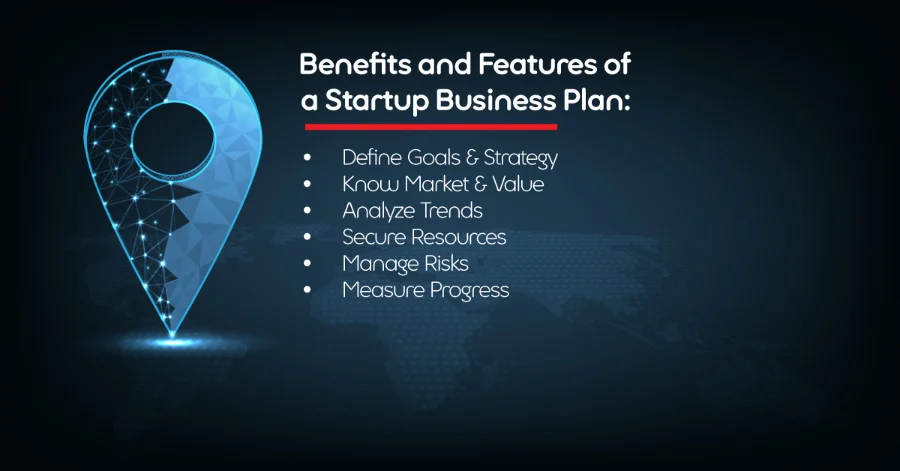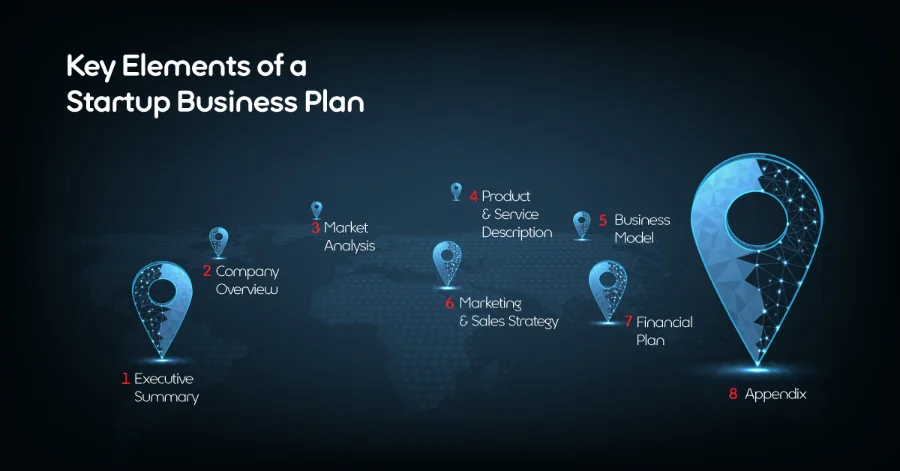Launching your Startup and leaving an indelible mark on the world is a dream shared by many. Every year, thousands of aspiring entrepreneurs embark on this exhilarating journey, fueled by their unique visions and ambitions. Yet, the path to startup success is fraught with challenges, and not all ventures reach their destination.
What sets the victorious startups apart from those that falter on the way? While numerous factors come into play, one often overlooked yet undeniably critical element shines through: the Startup Business Plan.
In this article, we’ll delve into the pivotal role played by the Startup Business Plan in your entrepreneurial voyage. We’ll explore its significance as a guiding force throughout your startup’s evolution, providing you with the insights and knowledge needed to navigate the entrepreneurial landscape effectively.
Why You Need a Startup Business Plan
Imagine embarking on a road trip to an uncharted destination. You have a vague idea of your endpoint, but the specifics remain shrouded in uncertainty. Routes, potential obstacles, and resource requirements are all uncertain.
Now, envision two scenarios: In the first, you leap into your car and set off, fingers crossed, hoping everything falls into place. In the second, you meticulously plan your journey, researching routes, checking the weather, packing essentials, and budgeting expenses. Which would you choose? Most would opt for the second, armed with preparation to avert unforeseen obstacles.
Starting a new venture parallels this scenario closely. A Startup Business Plan isn’t merely a document; it’s your roadmap, guiding every step of your startup’s growth. It also acts as your persuasive tool when pitching your startup to potential investors, partners, customers, and employees. It showcases your diligent research, crystal-clear vision, direction, and the viability and scalability of your business model.
Join us in this article as we unveil why a Startup Business Plan is your compass to entrepreneurial success. We’ll explore the vital elements that compose this plan, elucidate their significance, and provide you with valuable insights to help you create a Startup Business Plan that propels you toward growth and triumph. Let’s begin.

Benefits and Features of a Startup Business Plan
A Startup Business Plan is essential for your new venture because it helps you:
- Define your purpose, vision, mission, goals, and strategies.
- Understand your market, customer needs, and value proposition.
- Analyze your competitive landscape and industry trends.
- Secure funding and resources.
- Manage risks and uncertainties.
- Measure progress and performance.
Remember, a startup business plan is not a static document but a dynamic, evolving one that reflects your current reality and future aspirations.

Key Elements of a Startup Business Plan
Crafting a comprehensive Startup Business Plan involves addressing several key elements. Think of these elements as building blocks that collectively form a robust foundation for your entrepreneurial journey:
Executive Summary
The Executive Summary acts as your startup’s elevator pitch. It’s often the first section that potential investors or partners will read, so it’s vital to make it compelling. Here, you provide a concise yet impactful overview of your entire business plan. Include:
- Your startup’s name, location, and mission statement.
- A brief introduction to your startup and the problem it addresses.
- The market opportunity and target customer segment.
- Your competitive advantage and unique value proposition.
- The current status of your startup and your future goals.
- The amount of funding you’re seeking.
While it appears at the beginning of your business plan, it’s often best to write the Executive Summary after you’ve completed the rest of the plan. This way, you can succinctly summarize the main points.
Company Overview
The Company Overview section provides valuable context about your startup. It offers insights into your startup’s history, structure, and the team behind it. Key components include:
- A brief history and origin of your startup, highlighting any significant milestones.
- Details about your startup’s legal structure and ownership.
- The vision and core values that drive your company’s mission.
- An introduction to your team members, emphasizing their roles and expertise.
- Information about your startup’s physical location and facilities, if applicable.
This section sets the stage for readers, giving them a better understanding of your startup’s identity and the individuals driving it forward.
Market Analysis
To build a successful startup, you need a deep understanding of your industry, market, and customers. In the Market Analysis section, you’ll delve into these critical aspects:
- An industry overview that highlights current trends and potential future developments.
- A thorough examination of your market, including its size and segmentation.
- Detailed insights into your target customer profile and their needs.
- A competitive analysis that identifies key rivals and your positioning in the market.
- A SWOT analysis (Strengths, Weaknesses, Opportunities, and Threats) that provides a strategic assessment.
Back your claims with credible sources, such as reports, surveys, and statistics, to bolster the credibility of your analysis.
Product or Service Description
Your product or service is at the heart of your startup, and this section allows you to showcase its features, benefits, and value proposition:
- Clearly define the problem your product or service solves.
- Present detailed specifications and features.
- Highlight the benefits and advantages it offers to customers.
- Emphasize your unique value proposition and how it sets you apart.
- Describe the development timeline and launch plan.
This section aims to make readers understand the essence of your offering and why it’s valuable to your target audience.
Business Model
Your Business Model is all about revenue generation and creating value. Here, you’ll outline how your startup plans to achieve sustainability and profitability:
- Detail your revenue streams and pricing strategies.
- Break down your cost structure and perform a break-even analysis.
- Identify key resources and activities required for your operations.
- Highlight essential partnerships and distribution channels.
- Set key metrics and milestones to measure your progress.
Use diagrams and models to illustrate the logic behind your business model and financial calculations, making it easier for readers to grasp.
Marketing and Sales Strategy
In this section, you’ll lay out your plan for attracting, acquiring, and retaining customers:
- Define your marketing objectives and goals.
- Explain your marketing mix, covering product, price, place, and promotion strategies.
- Outline your sales funnel and customer acquisition process.
- Describe customer relationship strategies and retention efforts.
- Include a marketing budget and forecast.
The Marketing and Sales Strategy is where you translate your market understanding into actionable plans.
Financial Plan
The Financial Plan projects your startup’s financial performance and viability. It provides a clear picture of your financial health and prospects:
- Present financial statements, including income statements, cash flow statements, balance sheets, and statements of changes in equity.
- Utilize financial ratios and indicators to assess your startup’s financial stability.
- Share your financial assumptions and associated risks.
- Specify your funding requirements and potential sources of capital.
This section demonstrates your financial acumen and your startup’s potential for sustainable growth.
Appendix (Optional)
While not always necessary, the Appendix is a space to include supplementary information or documents that support your business plan:
- Attach resumes and bios of key team members to showcase their qualifications.
- Include customer testimonials and feedback to bolster credibility.
- Attach any patents, licenses, contracts, or agreements relevant to your startup.
- Provide references and citations to substantiate your claims.
The Appendix serves as a resource for readers who want to explore specific details further.
By following this structured approach, your Startup Business Plan becomes a cohesive and logical document that guides your startup’s journey from inception to success. Each element plays a vital role in conveying your vision and strategy to potential stakeholders. Remember, a well-crafted plan not only serves as a roadmap but also as a persuasive tool in securing support for your venture.

In this article, we’ve highlighted the importance of a Startup Business Plan and outlined its key elements. Crafting a well-thought-out plan is essential for the success of your startup. Remember, it’s not just a one-time document but a living guide that evolves with your venture.
At Seedel, we offer comprehensive services to assist you in creating a Startup Business Plan tailored to your needs. Our team of professionals can provide guidance, writing, editing, and formatting, ensuring a high-quality plan that reflects your unique vision and goals.
Now that you have the knowledge and tools, take action and start crafting your winning Startup Business Plan. If you require any assistance, don’t hesitate to reach out to Seedel Services. We’re here to support your exciting startup journey.
Thank you for reading, and we look forward to helping you succeed!







